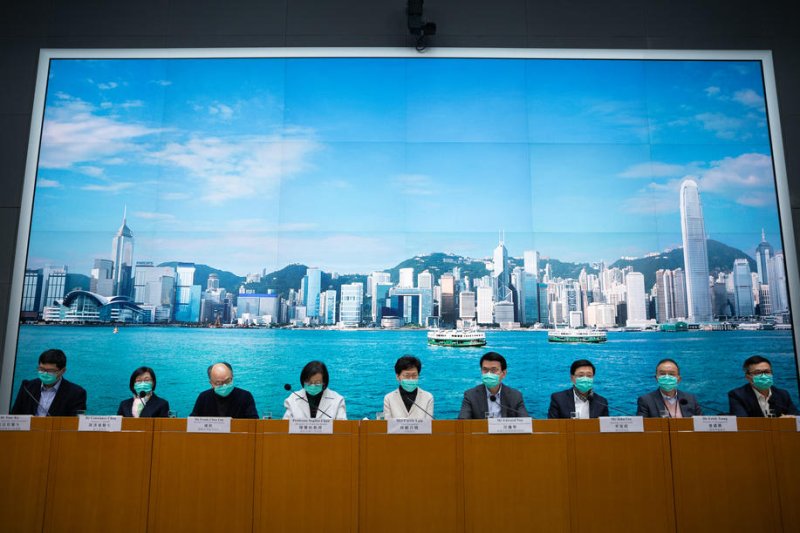Hong Kong Chief Executive Carrie Lam (center) announces travel restrictions Tuesday in a bid to halt the coronavirus outbreak. Photo by Jerome Favre/EPA-EFE
Jan. 28 (UPI) -- Chinese health officials reported early Wednesday that 26 people have died since the day prior, increasing the death toll from an outbreak of a deadly coronavirus to 132 as Hong Kong officials clamp down on its border with mainland China to contain its spread.
In a statement, China's National Health Commission said as of midnight Tuesday, it had received nearly 1,459 new cases, increasing the total number of confirmed cases nationwide to 5,974. It reported an additional 9,239 suspected cases with nearly 60,000 others currently undergoing medical observation.
In Hubei province, health officials confirmed 840 new cases with 315 located in Wuhan city, the epicenter of the outbreak. Twenty-five of the 26 new deaths were reported in Hubei, which also accounts for 3,554 confirmed cases of the disease, known as 2019-nCoV.
In Hong Kong, eight cases have been confirmed, and officials there are working to prevent further spread of the disease from the mainland.
Hong Kong leader Carrie Lam announced travel restrictions between the Beijing-controlled territory and the mainland, although she stopped short of a full-scale border closure. Lam said two passenger rail lines connecting Hong Kong with the mainland will be suspended starting at midnight Thursday, as the first two cases of the Wuhan coronavirus were found to have entered via the rail link.
Flights between the two sides will be cut by half, she said, and cross-border tour buses will also be reduced. Lam added that China has agreed to stop issuing tourist visas to mainlanders seeking to visit Hong Kong.
"The flow of people between the two places needs to be drastically reduced," she said.
The U.S. Centers for Disease Control issued its highest-level warning advising against "all nonessential travel to China."
Since the start of the outbreak in early December, cases have been confirmed as far from China as Canada and the United States and as near as South Korea and Thailand, the latter reporting 14 confirmed cases on Tuesday, the second most next to China.
Dr. Sukhum Kanchanaphimai of the Ministry of Public Health confirmed six new cases of the disease among two females and four males, including children. All are Chinese nationals who had traveled to Thailand from Wuhan and five of them are from the same family.
"Currently, all cases are improving," the Ministry of Public Health said in a statement.
In Japan and Germany, officials reported their first human-to-human transmission of the virus not connected with travel to China.
The Japanese case, its sixth, involves a tour bus driver. In Germany, health officials said a man from the Starnberg region of Bavaria had been hospitalized with the coronavirus, but added that the risk of transmission to the local population was low.
Meanwhile, World Health Organization officials met with Chinese President Xi Jinping in Beijing Tuesday, agreeing that the international medical organization will send international experts to China as soon as possible to work with their Chinese counterparts to conduct a global response to the diseases spread.
Dr. Tedros Adhanom Ghebreyesus, WHO director-general, said stopping the spread of the coronavirus is his organization's "highest priority."
"We appreciate the seriousness with which China is taking this outbreak, especially the commitment from top leadership, and the transparency they have demonstrated, including sharing data and genetic sequence of the virus," he said.















